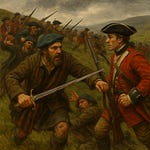Welcome back to "This Day in Scottish History." I'm your host, Colin MacDonald, and today we remember a tragic event that struck both Scotland and Ireland on September 16, 1937—the Kirkintilloch Fire Disaster. This somber incident claimed the lives of ten young Irishmen, forever etching their names into the shared history of two nations.
In the early morning hours of September 16, 1937, a fire broke out in a bothy—a simple stone barn—in Kirkintilloch, a town just east of Glasgow. Inside were ten boys and young men, aged 13 to 23, who had arrived from Achill Island, off the coast of County Mayo in Ireland, just the day before. These were seasonal workers, or "tattie hokers," who traveled to Scotland each year to pick potatoes, often staying for months at a time. Tragically, all ten young men were killed in the blaze.
The group of young Irish workers had been part of a larger squad of 26 migrant workers—14 women and 12 men—who had been hired for the potato harvest. It was common at the time for Irish families to send their children to Scotland for seasonal work, as the economic hardship back home left few other options. The girls in the group, along with the foreman and his 12-year-old son, were housed in an adjacent cottage and managed to escape. Despite their desperate attempts to save the boys from the fire, the bothy’s door was locked from the outside, making rescue impossible.
By the time a local potato merchant arrived with the key to the bothy, it was too late. The fire had already consumed the building, and the boys were trapped inside. News of the disaster spread quickly, reaching the close-knit community of Achill Island via telegram. The heartbreak that followed was indescribable, as many of the victims were related to each other—brothers, cousins, and close friends. Families gathered at the Garda station and the post office in Achill Sound, waiting for news about their loved ones.
The grief in Ireland was palpable, and there was an immediate outcry to bring the bodies of the deceased back home. Initially, there had been a suggestion that the young men be buried locally in Kirkintilloch. However, the islanders of Achill were quick to respond, sending a brief but powerful message in Gaelic: “Beir Abhaile Ar Marbh”—"Bring home our dead."
The return of the bodies became a deeply emotional event, uniting communities across both Scotland and Ireland. The ten young men’s bodies were transported by boat to Dublin, where crowds gathered to pay their respects. From there, a special train carried the coffins to Westport, with mourners lining the route. In Achill Sound, an estimated 3,000 people gathered as the bodies arrived by train—a symbolic journey on a line that had been closed just a few years earlier. The young men were laid to rest in a communal grave in Kildavnet Cemetery, a grave that still bears their names and the names of their villages:
Thomas Cattigan (Achill Sound)
Patrick Kilbane (Achill Sound)
Thomas Kilbane (Achill Sound)
Owen Kilbane (Shraheens)
John Mangan (Pollagh)
Thomas Mangan (Pollagh)
Michael Mangan (Pollagh)
John McLoughlin (Saula)
Martin McLoughlin (Saula)
Patrick McNeela (Shraheens)
This tragedy struck at the heart of not just the families involved, but both nations. The Kirkintilloch Fire led to increased scrutiny on the working and living conditions of the Irish seasonal laborers. At the time, many migrant workers lived in precarious conditions, often housed in unsafe and overcrowded accommodations, like the bothy that became a deathtrap for these young men. It prompted calls for reform, but the changes were slow to come.
Decades later, the Kirkintilloch Fire Disaster remains a potent reminder of the sacrifices made by migrant workers and the dangers they faced. In the 1990s, a commemorative project between Achill Island and Kirkintilloch produced storyboards and exhibitions to honor the memory of those who perished. This project helped keep alive the memory of the ten men, fostering a sense of shared history between the two regions. A stone memorial now stands in Kirkintilloch, and both communities have continued to honor the victims through various memorials and media tributes, including broadcasts on RTÉ and documentaries.
As we reflect on the Kirkintilloch Fire Disaster, we are reminded of the human cost of economic migration and the importance of remembering those who perished under tragic circumstances. It is a poignant chapter in the history of both Ireland and Scotland, one that underscores the deep connections between these two nations—connections forged not just through shared history, but also through the sacrifices and hardships of ordinary people.
Thank you for joining us on this journey through history. Please tune in tomorrow for another episode of "This Day in Scottish History." I’m Colin MacDonald. Haste Ye Back.













Share this post